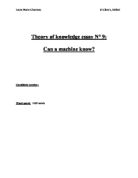Reasoning as a whole believes in self-justifying beliefs of logic, geometry and math. It appears eternal, distinct and clear ideas that are certainly beyond other forms of knowledge. It is very rational, as they believe that reasoning is the ultimate source of knowledge.
The second way of knowing is through sense perception, through this way we believe that the ultimate source of knowledge is through experience. Our concepts are formed from our sense experience. Our mind retains the sense experience as a kind of copy so that we are able to think about the things when we are not experiencing it and recognize them the next time we encounter it.
Another way of knowing is through language. Language is a process whereby information is encoded and imparted by a sender to a receiver via a channel or medium. It is like a symbol system, representing the world, capturing and communicating our thoughts and experience. It can transform and shape thought and actions. It is a way of knowing, as when we use knowledge, we classify the world. This classification helps to analyze the world and generate other beliefs about the world. One example is from the British media from their wars where they described their own troops as cautious and resolute while on the other hand they described the enemy’s soldiers as desperate and ruthless. From this we are able to see that language is able to influence the way we know and our knowledge.
And finally, emotion is a way of knowing through our gut feeling. It is a judgment that appears quickly in consciousness, whose underlying process we are not fully aware of, yes is strong enough to act upon. Our emotion gives us meanings to things which allows us to prioritize things which helps us to choose giving us an emotional attachment so that we can relate to the world.
However, I find too many flaws in ‘how you know it’. Firstly, for reasoning it takes a long time and the disadvantage of deductive reasoning is that we must have some truths in hand before starting and conclusions can be rather tentative.
While the disadvantages of sense perception, is that there are some concepts that are too difficult to comprehend that are dealing with personal thinking such as justice and freedom as none of our senses are able to deal with these topics and as our concepts are derived from our experiences of it, how are we able to have a concept of something we do not even have the experience of.
As for language, language is never neutral; we will always be influenced by the words from the media. Language is able to manipulate our thoughts in such a way that we become corrupted by it. Another negative aspect of language is that sometimes we cannot explain ourselves due to language barriers. This quote from Michael Polyani sums it all up ‘I know more than I can say.’
And as for emotions, is that our intuitive feeling cannot answer to many higher level and scientific questions. One example is ‘is the world round?’
Thus I disagree with it due to the flaws I mentioned above. However, if we put together all the different ways we know to gain knowledge the flaws would be minimized. Therefore I infer that it does not matter how we get the information, but it is the information that we know that is crucial as it is what we know that defines a person. If what we know is corrupted, than we would be corrupted as a whole. So I believe that what we know is more important than how we know. (787 words)







